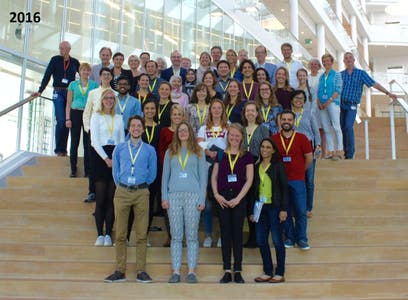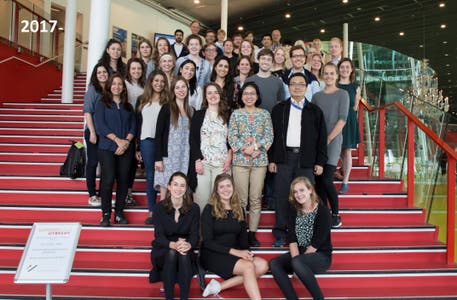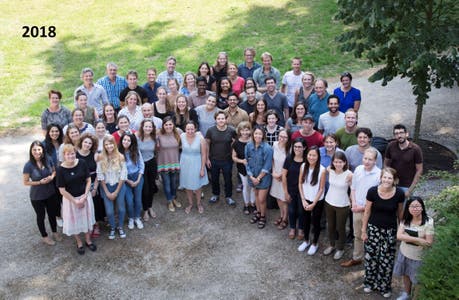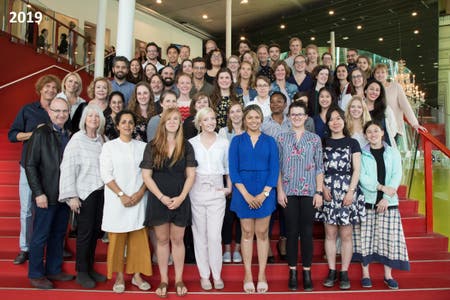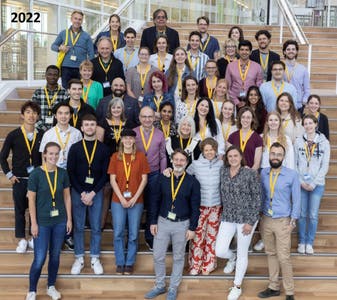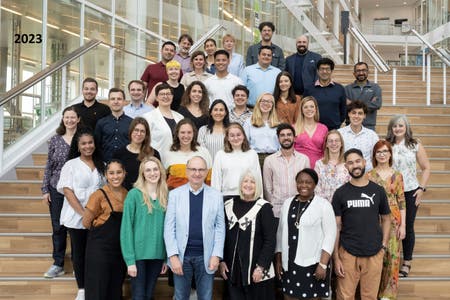Education and research
Clinicians, researchers, patients, and industry all need to be involved to ask research questions that are clinically relevant and translate research outcomes to tangible products at the bedside. Translational scientists, who are either PhDs with an interest in clinical research or clinician-scientists, need to obtain a broad range of skills to navigate the translational pathway.
They need to learn how to work effectively in interdisciplinary teams and communicate with a broad range of stakeholders. Clinician-scientists have a dual role, as they are trained in both research and clinical practice, and can therefore play an important role in further closing the gap between research and clinical practice.
UMC Utrecht invests in educating the next generation of translational scientists and in research to further improve training and career pathways for translational scientists. This is necessary, as becoming a successful translational scientist or clinician-scientist is challenging. The competitive funding system, the pressure to publish, and the lack of training and career pathways make this a challenge.
The educational strategy of UMC Utrecht shows that educating translational professionals is of high importance for UMC Utrecht. This is illustrated by its focus on inter-professional education, strengthening the connection with patients, improving patient participation in education, and creating awareness of the societal impact of research.
Selective Utrecht Medical Master (SUMMA)
The SUMMA is a concrete example of this, as it focuses on the training of clinician-scientists. The four-year SUMMA program is for students with a Bachelor’s degree in biomedical or life sciences, and combines a medical degree with a degree in clinical science. After four years, SUMMA graduates are prepared for a career that combines clinical practice with research activities. These graduates can play an important role in the translation of research outcomes to patient care.
International initiatives uitklapper, klik om te openen
UMC Utrecht also participates in further improving and developing the education of translational scientists and clinician-scientists in an international context. Crucial for this development is the partnership with the Eureka Institute.
The ‘PATHWAY project’
Together with Eureka, the UMC Utrecht embarked on several initiatives. In collaboration with University College London, University of Granada, Ghent University and Nutricia Research, UMC Utrecht successfully applied for a European Erasmus+ grant that resulted in the ‘PATHWAY project’. The objectives of this project are to create efficient and sustainable career pathways for clinician-scientists, to integrate research and clinical components in the training of clinician-scientists, and to generate impact by raising awareness amongst stakeholders throughout Europe. Altogether, this contributes to an overall aim to bridge the gap between bench and bedside by training clinicianscientists for the academic and industrial workforce.
UMC Utrecht and University of Toronto research collaboration
In 2015, UMC Utrecht and the University of Toronto started an international research collaboration to support the clinician-scientist workforce. Research on the professional identity development, training, and career pathways of clinician-scientists is needed, as this workforce is both ageing and declining. The aim is to investigate how clinician-scientists develop their professional identity around their dual roles in both clinical practice and research, and how training and career pathways should improve to support early- career clinician-scientists. These studies are performed within the Eureka Network.
The Julius Center for Health Sciences and Primary Care also performs research on general practitioners who become clinician-scientists, because a need for an increasing number of professionals with a research degree has also been identified within primary care.
Together, the educational and research activities that take place within UMC Utrecht aim to improve the education and career support for these professionals, who are vital players in the field of Translational Medicine.
UMC Utrecht Eureka Summer Courses uitklapper, klik om te openen
Participating in the Eureka/UMC Utrecht Summer Course on Translational Medicine is like entering a bubble. With a group of about 30 students and almost as many faculty members, you go through an intense week with a surprising mix of presentation formats and content, of social and scientific activities, and of regular and unorthodox teaching methods. And you are all in it together.
The first thing you will notice is that the many inconvenient truths of the scientific enterprise are openly discussed. This reflects the fact that the UMC Utrecht is home to Science in Transition, an initiative that criticizes how incentives and rewards shape the quality and relevance of science.
At the same time, inside the bubble you will find all the tools and knowledge to make a positive difference as a translational researcher. The dedicated faculty has an outstanding reputation as both translational scientists and as teachers. The curriculum is developed with the Eureka Institute, which has a decade of experience in Translational Medicine.
But the most important part, of course, is your fellow travelers inside the bubble. They are young and motivated researchers from around the globe that meet each other in Utrecht with a common belief: that biomedical research can improve our lives, and that they can add to that.
The inspiration and energy are contagious, and long after leaving the bubble you will feel the effects of the one-week course. You will no longer take ‘how science works’ for granted. You will feel empowered to make a change by reaching out to colleagues, peers and stakeholders, and together you will give biomedical research the impact that it should have.
Research uitklapper, klik om te openen
Nathalie Brandenburg
Innovating graduate education in translational science
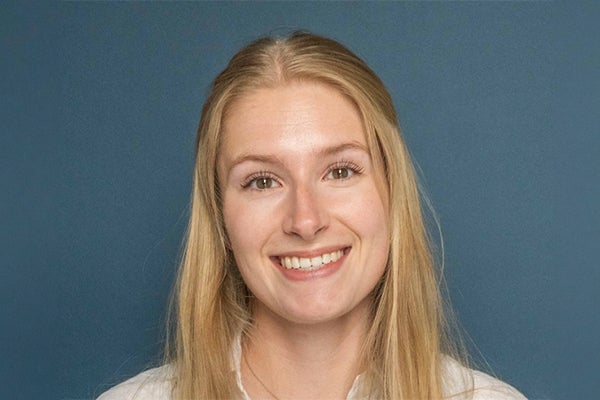
My research focuses on innovating graduate education in translational science. I will evaluate and validate existing educational initiatives on this topic, but also work on developing and implementing new research-based education in the graduate program. The goal is to optimise our education, in order to provide students and professionals with the right assets to address real-world clinical problems and create a practical solution that help patients, communities and/or the healthcare system.
Translational scientists face many challenges with regard to the entire translational research pipeline, and the rewarding & recognition system within the scientific world. Mentorship plays an essential role in guidance and empowerment of a translational scientist. Therefore, part of my project focuses on improving and evaluating the effectiveness of The Eureka Pathway Program: the international mentorship program for translational scientists of the Eureka Institute.
Through innovating and integrating education and mentorship in translational science, I hope to empower current and future scientists who really want to have an impact with their research.
Farah Kools
How Can Translational Scientists Be Rewarded and Supported in Their Careers?
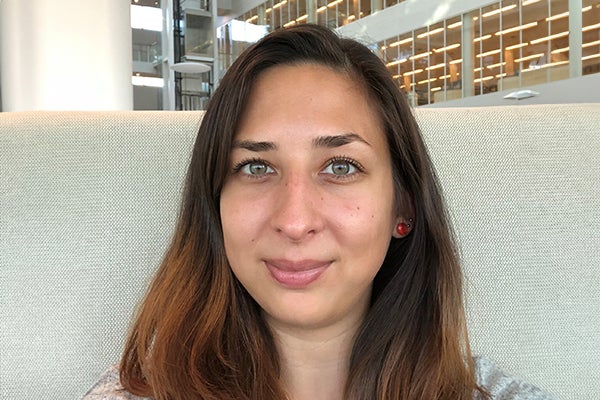
This is the overarching research question of my PhD dissertation. During my biomedical training I became interested in the pivotal role this subset of biomedical scientists has in bringing much needed healthcare innovations into clinical settings. While learning about the complex translational pipeline and the many stakeholders involved, I couldn’t help but notice opposing forces within the careers of translational scientists.
On the one hand these scientists are working towards solving unmet patient needs, on the other they are largely assessed on metrics such as publication and citation records. These records are classic metrics used to evaluate scientific careers, but in the case of translational scientists their main goal is to create patient impact which involves work outside of the research domain. Negative consequences of publication pressure, e.g., increased scientific misconduct and burn-out, are challenges all researchers face.
On top of that, translational scientists often lack comprehensive reward structures recognizing their specialized work beyond research activities. So how can translational scientists be rewarded and supported in their careers? We found a need for alternative performance measurements that include tasks within other domains (e.g., clinical and educational), mentorship programs to develop mentorship skills, receive and provide career support, and gain or expand an (international) network of translational scientists, and the development of translational competencies at graduate-level to support sustainable career pathways. We hope this dissertation can contribute towards mitigating the opposing forces within the careers of translational scientists and facilitate their ultimate goal of impacting patients.
Eureka Summer classes
UMC Utrecht Eureka Summer Course Edition 2017
Anneke Monninkhof, Nienke de Graeff, and Margot Weggemans - Alumni 2017 edition
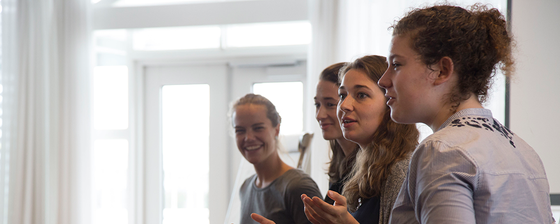
“There are many examples of individuals and institutions who take the initiative to close the gap between research and clinical practice. However, it is impossible for individual institutions to change the system as a whole. During the summer school on Translational Medicine we came up with the idea of an ‘Impact Index’: a label that indicates what institutions already do to close the research-practice gap. This index would have two goals: to create transparency on ‘best-practices’ of institutions that already invest in improving the quality of research and translating research outcomes to the patient, and to encourage institutions that have fallen behind to invest in improving the quality of research, using the best- practices available.”
UMC Utrecht Eureka Summer Course Edition 2016
Nikmah S Idris, Pulmonary Hypertension Clinical Fellow, Great Ormond Street Hospital and Paediatric Cardiology, Staff University of Indonesia - Alumna 2016 edition
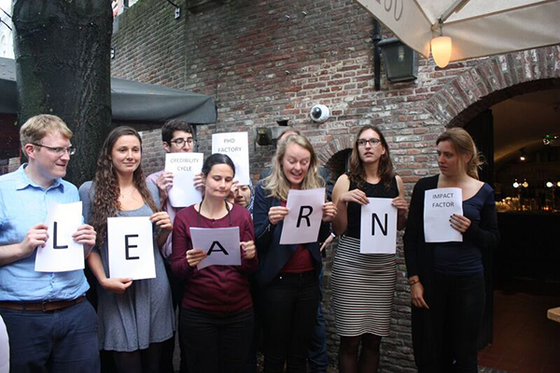
“I am particularly impressed by the diversity of the groups and the fact that we will face the same situation when we would practice Translational Medicine. Also, I learned a lot about how to cope with challenges and hurdles. I will spread the concept of Translational Medicine in my home institution by writing an article in local journals.”

